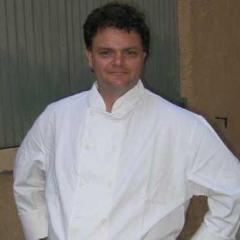When you cook a terrine de foie gras, you let it cool and then remove the half centimetre or so of fat which has congealed on top, keeping it in a safe place for later use. Then you put a weight on top to 'tasser' it, to compact it. Being careful, of course, to put a cover the size of the top of the foie gras on top of the foie gras so that the litre or two of cream you use as a weight doesn't sink into it, since it's narrower than the width of the terrine dish. I forgot the cover the size of the top of the terrine so my litre of cream slowly sank into the foie gras.
As for not having to be told what to do, I guess that comes with experience; I've written something I'll try to dig up about how, one day, I suddenly realised I was slicing some gravlax salmon into perfect, thin slices without really thinking about it, and realised that I'd developed new talents along the way.
I almost always consult recipes still these days though. There is a great book, Le Repertoire de la Cuisine, which is all of Escoffier's recipes from Le Guide Culinaire distilled down to its ingredients which I saw in every kitchen I worked in. It literally just lists the ingredients, not quantities or techniques, as a sort of aide memoire for cooks - just to remind you what goes into such and such a soup or sauce because, obviously, you know the techniques and quantities. In fact my personal recipe book normally only has ingredients and quantities for each recipe, I usually always remember the technique.
And when I was working in kitchens the recipes for, say, madeleines or Potage du Barry were familiar enough to not have to look them up at all. I was cooking six or more days a week, making the recipes all the time so they became muscle memory. Even now some are like that - the famous Trilogies for example. I've made thousands of them and no longer need to read a recipe. In fact, I don't think I've eve got it written down now.
I also find that I can gauge to within a ten grammes or so most things I weigh, and time things to within a few seconds - I often arrive in front of the oven or whatever as the timer clicks down from 5 seconds to zero. It all comes from having done it so many times over so many years.






